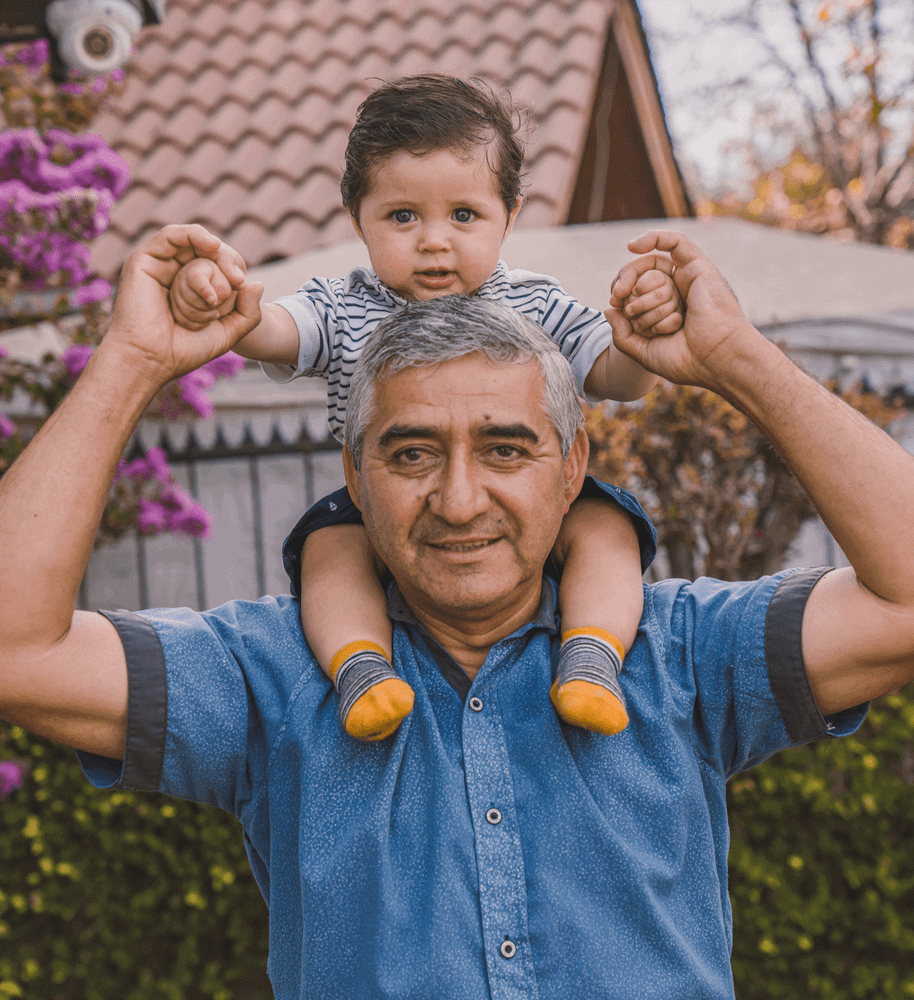The Canadian family has changed significantly in our lifetime. No one picture depicts the Canadian family, but there is one constant — grandparents whether they live down the street, thousands of miles away or only in our memories and hearts. Some of us are raising our grandchildren, some of us use technology to stay in touch and we see how social issues are touching our lives and the lives of our grandchildren’s.
The happiness and prosperity we wish for our children now extends to our grandchildren. We want to help them grow and succeed in life. And when we become grandparents, we start to see the world through a different lens which can be helpful. But there is a catch. We are no longer parents. We are not the primary decision makers anymore. We have to take a step back and sometimes even bite our tongue. Nevertheless, the role we can play in our grandchildren’s lives is an important one.
- Sharing life experiences
- Bringing calm and a sense of security
- Sharing world experiences
- Creating cultural links
- Being a child advocate
- Teaching respect and a sense of duty
- Caregiver and kinship care
Sharing life experiences
With age comes wisdom – grandparents know that more than anyone else. Our life experiences have given us a perspective on the world that our grandchildren’s parents cannot. There is a world of difference between life at 35 and life at 60.
The world is dramatically different now, but our grandchildren still face the same challenges we did – bullying, rejection, insecurities. It just presents itself differently. We know that there are good people and there are selfish, insecure ones. We have lived long enough to recognize the difference. A close relationship with our grandchildren can give them confidence in themselves to see people as they are.
Learning from past mistakes has never been more valuable than when you become a grandparent. Think of how many times we reflect on how we raised our children and have said: “If I had known, I would have done that differently.” Now we know and we can do things differently with our grandchildren – and much to our grandchildren’s benefit.
Bringing calm and a sense of security
Grandparents can see things for what they are and provide unconditional love that can get lost in parent’s busy lives. Children need a place to feel accepted as they are and sometimes that is at the grands’ house.
Our “been there, done that” perspective helps our grandchildren realize that they are not alone, and they are not the first to experience what they are going through. We can say with confidence that when a preteen friend becomes cold and unfriendly, it is more their issue than our grandchild’s. We know that it will pass although our grandchildren would not immediately agree.
As parents, we loved unconditionally although we may not have appreciated its true meaning until we became grandparents. The surge of love that comes even at the thought of holding a grandchild never mind when we do is strong. That unencumbered unconditional love can create a determination to create a calm that every child needs but may not experience at home. While the unconditional love of a child’s parents is the most important, it can get lost in the parent’s hopes and dreams for their child. At times, their egos may get in the way. Grandparents often can see it and can offer that extra hug. Sometimes that extra layer of assurance can create a calm and sense of security.
A Boston College research study in 2014 found that “an emotionally close relationship between grandparent and grandchild is associated with fewer symptoms of depression for both generations.”
Sharing world experiences
Collectively, Canadian grandparents have been around the world a few times. Whether it was backpacking after graduation or winter vacations in warm climates, trips to our own grandparents across the country or moving to another continent, we understand the world from a different perspective. We have watched the world unfold for over 50 years and have learned to put politics and human interests in perspective. Our grandchildren share our curiosity about the world but are learning about through channels like social media never available to us. Our experiences and lessons learned can provide a grounded perspective.
With COVID restricting the international travel many of us enjoy, our travel experiences make for indulging conversations with our grandchildren. Maye Musk, the international model who made headlines when she was named the face of Covergirl at age 69 moved from Canada to South Africa when she was two. Her father was following his passion for exploration. In an interview with Canadian Grandparents , she said she tells her grandchildren about her travels through South Africa and her summers crossing the Kalahari Desert with her family. She said, “It gives them a sense of adventure.”
, she said she tells her grandchildren about her travels through South Africa and her summers crossing the Kalahari Desert with her family. She said, “It gives them a sense of adventure.”
Before COVID, Canadian grandparents were travelling with grandchildren more and more. Sally Armstrong, a writer for the Toronto Star, was vacationing in Paris, France with her 11 old daughter when the Notre Dame cathedral caught fire . Every vacation with grandchildren will not be that dramatic but they do hold their unique moments.
. Every vacation with grandchildren will not be that dramatic but they do hold their unique moments.
Creating cultural links
Grandparents offer a family perspective from the past and the present. Grandparents are often the ones with the time to share the stories and show family pictures and artifacts. We can also share stories of our family’s past when we were grandchildren and we share stories of our children when they were young. Grandchildren love that peek through the window of their parent’s childhood.
In Canada, the multicultural tapestry is bold and vibrant. Families come from all over the world and weave the traditions of their home country into the Canadian way of life. Understanding the family’s past gives our grandchildren a sense of belonging. According to Statistics Canada, 21% of grandparents were not born here.
Dr. Marshal Duke and Dr. Robyn Fivush, two researchers from Emory University explored the theory that children who know about their family do better when faced with challenges. Their research with four dozen families showed that the more children knew about their family’s history, the stronger their sense of control over their lives was, the higher their self-esteem was and the more they believed in their families.
do better when faced with challenges. Their research with four dozen families showed that the more children knew about their family’s history, the stronger their sense of control over their lives was, the higher their self-esteem was and the more they believed in their families.
Family history is a shared experience between grandchildren and grandparents. Engaging children means showing the relevance to them. It may be who they look like or character traits. Sharing what life was like growing up can be a fun trip down memory lane highlighting the pop culture and activities of youth at the time.
The Mayo Clinic emphasizes the benefit of knowing family history is in identifying family health patterns and health risks that are hereditary. When going to the emergency room patients are often asked about the history of cancer, or heart disease in their family, specifically parents
Being a child advocate
Life can be complicated for a grandchild when living in a home fraught with disruptive behaviour like drug addiction, divorce, abuse and alcoholism. The emotional separation can leave a grandchild confused and angry. Some grandparents can help by offering a calm surrounding where the grandchild feels secure and loved.
There are times, however, when refuge is not enough, and legal action is needed to ensure their safety. Grandparents often have firsthand knowledge of the difficulty the grandchildren are having and can speak to it. They can speak for them and work with law enforcement and health professionals to ensure safety on long term solutions. There have been court cases when the grandparents have been awarded full custody because of the security they can provide.
Teaching respect and a sense of duty
Grandparents are part of a generation known for its generosity in giving their time and money.
According to Statistics Canada (2010), seniors volunteer an average of 233 hours a year with the arts and culture; sports and recreation; and law advocacy and politics being the most popular.
They also are active in their community supporting their grandchildren’s school activities and supporting their fundraising endeavours.
This visible generosity shows grandchildren the value of giving back and the difference it can make. An AARP (American Association of Retired Persons) survey of grandparents revealed that 78% of grandparents say they have discussed values with their grandchildren.
Our grandchildren learn values when they are with us. Grandchildren learn by example and when they see values played out, they are more likely to emulate them. As they get older, they will develop their values. Grandparents may have their values challenged but part of growing up for grandchildren is to question what is around them and talk it through. Grandparents play an important role in helping them develop their perspectives.
Caregivers and kinship care
Financial demands on families often mean both parents must work. In other circumstances, both parents know they make better parents having a career and see the developmental benefits of daycare for their children.
Grandparents are playing a role more and more in Canada. Whether they are asked to help, or they offer to be more involved with their grandchildren, they are stepping forward to support the family beyond just babysitting.
The living arrangements vary as some live nearby while others live with the family. According to the Statistics Canada 2017 report, Family Matters, five percent of grandparents live with at least one grandchild. In Inuit communities, 22% of grandparents do.
A CBC.ca report in May 2019 highlights the stories of grandmothers who happily provide daycare for their grandchildren. Their reason for doing it vary. Sandra Fowler helps because there was a shortage of daycare in Regina, Saskatchewan. She lives in Saskatoon and drives two hours to get to her daughter’s home. She has taken an apartment nearby where she lives during the week.
Janet Blair also lives in Regina and looks after her grandchildren to help financially and because she enjoys it. She had stayed at home when her children were small and likes regular contact with her grandchildren while they are small. She acknowledges that the commitment of three days a week does take away time with her retired husband who gets concerned for her health.
An AGA (American Grandparent Association) survey revealed that 63% of grandparents “say they can do a better job caring for grandchildren than they did with their own.”
Related Stories
7 Ways to Spark a Grandchild’s Interest in Family History

